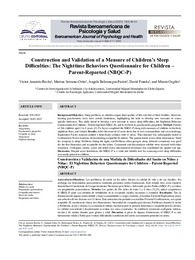Título :
Construction and Validation of a Measure of Children's Sleep Difficulties: The Nightime Behaviors Questionnaire for Children - Parent-Reported (NBQC-P) |
Autor :
Amorós-Reche, Víctor
Serrano-Ortiz, Marina
Belzunegui-Pastor, Ángela
Pineda, David
Orgilés, Mireia |
Editor :
Universidad Miguel Hernández de Elche |
Departamento:
Departamentos de la UMH::Psicología de la Salud |
Fecha de publicación:
2025 |
URI :
https://hdl.handle.net/11000/37765 |
Resumen :
Background/Objective: Sleep problems in children impair their quality of life and that of their families. However, existing psychometric tools have certain limitations, highlighting the need to develop new measures to assess specific behaviors. This study aimed to develop a new measure to assess sleep difficulties, the Nighttime Behavior Questionnaire for Children – Parent-reported (NBQC-P), and to evaluate its psychometric properties. Method: Parents of 386 children aged 3 to 8 years (52.3% boys) completed the NBQC-P along with measures of abilities in the dark, nighttime fears, and anxiety. Results: After the removal of some items due to low communalities and cross-loadings, Exploratory Factor Analysis yielded a three-factor solution with 13 items. This structure was subsequently tested in Confirmatory Factor Analysis, demonstrating acceptable fit indices. The questionnaire covers three dimensions: Need for company to sleep, Problems during the night, and Problems when going to sleep. Internal consistency was good for the first dimension and acceptable for the others. Concurrent and discriminant validity were assessed with other constructs. Configural, metric, scalar and latent mean measurement invariance was established for gender and age. Discussion: Despite some limitations, the NBQC-P is a valid and reliable tool for assessing overt sleep difficulties commonly present in children. Antecedentes/Objetivos: Los problemas de sueño en los niños afectan su calidad de vida y de sus familias. Sin embargo, las herramientas psicométricas existentes presentan ciertas limitaciones. Este estudio tuvo como objetivo desarrollar el Cuestionario de Comportamientos Nocturnos para Niños – Informado por los Padres (NBQC-P), y evaluar sus propiedades psicométricas. Método: Los padres de 386 niños de entre 3 y 8 años (52,3% niños) completaron el NBQC-P junto con medidas de habilidades en la oscuridad, miedos nocturnos y ansiedad. Resultados: Tras la eliminación de algunos ítems debido a bajas comunalidades y cargas cruzadas, el Análisis Factorial Exploratorio arrojó una solución de tres factores con 13 ítems. Esta estructura fue probada con Análisis Factorial Confirmatorio, con ajuste aceptable. El cuestionario abarca tres dimensiones: Necesidad de compañía para dormir, Problemas durante la noche y Problemas al irse a dormir. La consistencia interna fue buena para la primera dimensión y aceptable para las demás. La validez concurrente y discriminante se evaluó con otros constructos. Se estableció invarianza configural, métrica, escalar y de medias latentes para género y edad. Discusión: A pesar de algunas limitaciones, el NBQC-P es una herramienta válida y fiable para evaluar dificultades manifiestas del sueño comúnmente presentes en niños.
|
Palabras clave/Materias:
Sleep habits
Psychometric properties
Company to sleep
Sleep on set
Night awakenings
Hábitos de sueño
Propiedades psicométricas
Compañía para dormir
Inicio del sueño
Despertares nocturnos |
Área de conocimiento :
CDU: Filosofía y psicología: Psicología |
Tipo de documento :
info:eu-repo/semantics/article |
Derechos de acceso:
info:eu-repo/semantics/openAccess
Attribution-NonCommercial-NoDerivatives 4.0 Internacional |
DOI :
https://doi.org/10.70478/ |
Publicado en:
Revista Iberoamericana de Psicología y Salud, Vol.16, Nº2 (2025) |
Aparece en las colecciones:
Artículos- Psicología de la Salud
|

 La licencia se describe como: Atribución-NonComercial-NoDerivada 4.0 Internacional.
La licencia se describe como: Atribución-NonComercial-NoDerivada 4.0 Internacional.
.png)